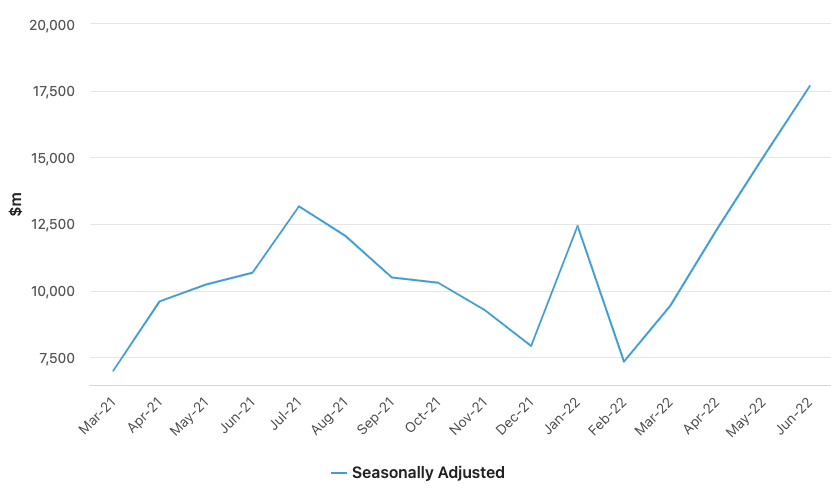Australian Dollar to "Catch its Breath" in September
- Written by: Gary Howes
- AUD was August's second-best performer
- Amidst ongoing demand for Aussie gas, coal and iron
- But, China's slowdown remains a key risk
- And Goldman Sachs say to adopt a defensive stance

Image © Adobe Images
The Australian Dollar is one of the better performing currencies of 2022 thanks to a stellar August, but analysts at investment bank Goldman Sachs say they are cautious on the currency on a "tactical basis".
The call comes amidst news one of China's mega cities has gone into lockdown as the country's authorities pursue their 'zero covid' approach to dealing with the coronavirus, raising concerns for the near-term outlook of Australia's main export market.
The Chinese metropolis of Chengdu will lock down its 21 million residents to contain a Covid-19 outbreak, a development that commentators say is a "seismic move" in the country's vast Western region that has largely been untouched by the virus.
The developments come amidst slowing factory growth in China and South East Asia more generally, as reported on September 01, symptomatic of a global economic slowdown that has some of its roots in China's approach to Covid.
"Despite a fresh round of Chinese stimulus spending that could boost China's demand for Australian commodities, downside risks to China (and global) growth remain in focus and over more tactical horizons we remain cautious on AUD," says Kamakshya Trivedi, Co-head of FX Strategy at Goldman Sachs.
Compare GBP to AUD Exchange Rates
Find out how much you could save on your pound to Australian dollar transfer
Potential saving vs high street banks:
A$4,875.00
Free • No obligation • Takes 2 minutes
China remains Australia's main market for commodity exports, therefore slowing demand in the world's second largest economy could have implications for Australia's future foreign exchange earnings.
"Iron ore prices continue to fall in China as covid and lower than expected construction activity hits steel demand," says John Meyer, head of analysis at brokerage SP Angel. "Sporadic covid lockdowns and fears of further lockdowns are hitting the Chinese economy hard".
Iron ore remains Australia's premier export product, and reduced flows could therefore impact the country's terms of trade.
Australia's record trade surplus could be close to peaking amidst softening iron ore prices and indications this week that global gas prices are starting to cool.
Above: Australia's trade surplus reached a new record in June. Source: ABS.
Natural gas is Australia's third most lucrative export earner.
Gas prices are lower as European nations are close to filling their strategic gas storage facilities, price declines are also aided by cooling weather in the Northern Hemisphere and a pick up in European wind generation.
The Australian Dollar starts September having been the second-best performing major currency of August, with only the U.S. Dollar doing better.
Outperformance was reflected in a 2.73% advance against the Pound that brought the Pound to Australian Dollar exchange rate (GBP/AUD) down to its lowest levels since 2017 at 1.6874. Those looking to buy Aussie Dollar's will today see the spot market at 1.6979, bank transfer rates at around 1.65 and rates at independent payment providers at 1.6931.
The Aussie recorded a 2.0% loss against the U.S. Dollar in August, but was up against all other G10 majors.
Although China's economy is performing well below potential, authorities continue to limit downside pressures via new support measures, something that invariably has protected the Aussie Dollar.
China stepped up its stimulus in August as the People's Bank of China (PBoC) cut its 1-year MLF and 7-day reverse repo mid-month, action that pushed yield on 10 year government debt down by about 10 basis points.
The PBoC also delivered its second asymmetric loan prime rate cut with a larger than expected 15bp cut on the 5-year LPR to stabilize the property market.
"The State Council announced additional 19 measures to support growth on top of 33 measures rolled out in May to resolve fiscal constraints while tackling emerging new challenges, which may yield an additional CNY1.5 trillion in funding support this year to boost infrastructure investments," says OCBC Bank in a recent research note.
How the Australian Dollar performs in September could therefore well depend on how China balances its Covid response with fiscal and monetary support.
Further declines in global commodity prices are also a factor to watch as 'peak energy' in Europe would see global energy prices ease, which would cool demand for Australia's relatively expensive (due to shipping costs) natural gas.
Goldman Sachs' Trivedi says he looks for the Aussie to "catch its breath":
""There are some macroeconomic tailwinds for the Aussie that could help support the currency, including a very strong trade surplus driven by strong prices of key exports from grains to metals and coal/LNG. However, despite a fresh round of Chinese stimulus spending that could boost China's demand for Australian commodities, downside risks to China (and global) growth remain in focus and over more tactical horizons we remain cautious on AUD vs USD."
Compare GBP to AUD Exchange Rates
Find out how much you could save on your pound to Australian dollar transfer
Potential saving vs high street banks:
A$4,875.00
Free • No obligation • Takes 2 minutes





